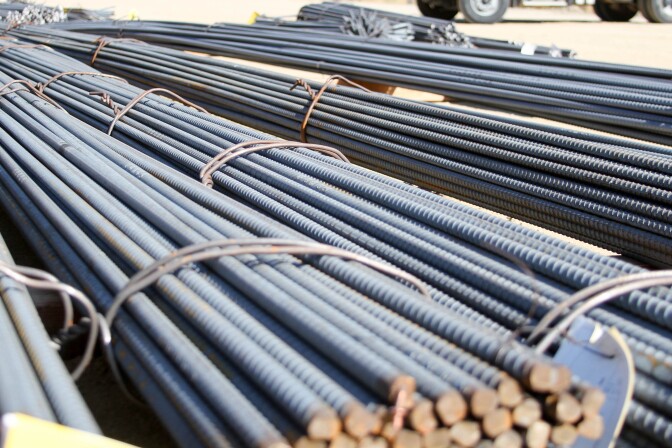This story is free to read because readers choose to support LAist. If you find value in independent local reporting, make a donation to power our newsroom today.
This archival content was originally written for and published on KPCC.org. Keep in mind that links and images may no longer work — and references may be outdated.
Why Trump's steel tariffs could have an outsize impact on California

Update: On March 8, President Trump formally ordered a 25 percent tariff on imported steel and 10 percent tariff on aluminum from every country in the world except Canada and Mexico.
President Donald Trump may be trying to save jobs in the Rust Belt with his 25 percent tariff on imported steel. But his actions could have an outsized impact in California.
The state does have about 5,500 steel workers, according to Bureau of Labor Statistics data from 2016. But UC Davis economist Katheryn Russ estimates that California has many more workers — over 100,000 — turning steel into products like hardware and car parts.
"Steel as an input affects the cost of production in a lot of different industries," Russ said.
She notes that President George W. Bush implemented tariffs on certain steel products in the early 2000s, and the outcome was not good for jobs.
The effects are difficult to quantify. But Russ points to estimates that as many as 10,000 steel jobs were saved by President Bush's tariffs — while anywhere from 26,000 to 200,000 jobs were lost in steel-using industries.
And saving jobs in the steel industry has only become more difficult, Russ said, due to technological advancements that mean employers now need fewer workers to produce the same amount of steel.
"How many jobs can we save if we raise the price of steel in the U.S.? It's hard to tell," Russ said. "You'd basically have to tell industries to stop innovating."
UCLA economist Edward Leamer said Trump's protectionist actions — through previously announced tariffs on imports of solar panels, washing machines and now steel and aluminum — could end up threatening more domestic jobs than they're intended to save.
"The reality is, in the areas of coal and steel, he's not going to be creating enough jobs to make a difference," said Leamer.
Los Angeles-based Hannibal Industries relies on domestic and imported steel. Executive vice president Steve Rogers says it's too soon to tell how his company would fare under Trump's tariffs, but he's concerned about rising costs and supply issues.
"There is not enough domestic steel-making capacity to fulfill steel demand in the United States," Rogers said.
Hannibal has more than 300 workers at its facility in Vernon, just outside of downtown Los Angeles. They take steel and fashion it into racks and tubes used for shelving units in warehouses. Rogers worries that tariffs could end up giving an advantage to foreign companies making the same products.
"We do compete with foreign finished goods, which we already have a hard time competing with just on a cost basis," he said.
About 25 percent of imported steel comes into the U.S. through the ports of Los Angeles and Long Beach.
Last year, a steel mill in Fontana — California Steel Industries — expressed concern about tariffs, saying Western states rely on imports. In a letter to the U.S. Department of Commerce, President and CEO Marcelo Botelho Rodrigues wrote that if tariffs were imposed, "the result could be the loss of thousands of U.S. jobs."
The nations exporting the most steel to the U.S. include Canada, Brazil and South Korea. Countries could respond to Trump's tariffs with trade restrictions of their own. A European Union official said on Friday that Europe is prepared to retaliate by slapping import duties on U.S. products, including jeans made by San Francisco-based Levi’s.








